Recombinant Mouse M-CSF/CSF1 Protein
$90.00 – $4,599.00
Category: M-CSF/CSF1 Proteins
SKU: EXRP001-10UG
In-stock products will arrive in 1 to 2 business days
Key Features
✓ Endotoxin Level: <1.0 EU/1ug
✓ Purity: >97% SDS-PAGE
✓ Biological Activity: Yes
✓ Expression System: E. coli
Need Help Ordering?
Product Details
Storage & Preparation
Data Images
Background
Product Documents
Product Details
| Biological Activity | Determined by a cell proliferation assay using mouse M-NFS-60 cells. The ED50 for this effect is typically <10 ng/mL. |
| Purity | >97% by SDS-PAGE and quantitative densitometry by Coomassie® Blue staining. |
| Endotoxin | <1.0 EU/1ug of the protein as determined by the LAL method. |
| Expression System | E. coli. Disulfide-linked homodimer |
| Accession Number | Q3U4F9 |
| Sequence | Lys33-Glu262, with an N-terminal Met
MKEVSEHCSH MIGNGHLKVL QQLIDSQMET SCQIAFEFVD QEQLDDPVCY LKKAFFLVQD IIDETMRFKD NTPNANATER LQELSNNLNS CFTKDYEEQN KACVRTFHET PLQLLEKIKN FFNETKNLLE KDWNIFTKNC NNSFAKCSSR DVVTKPDCNC LYPKATPSSD PASASPHQPP APSMAPLAGL AWDDSQRTEG SSLLPSELPL RIEDPGSAKQ RPPRSTCQTL E |
| Molecular Weight | 26.1 kDa (monomer, predicted) |
| Formulation | Lyophilized from sterile PBS with Trehalose, pH 7.4 |
Storage & Preparation
| Shipping | Shipped at ambient temperature. |
| Stability & Storage |
|
| Reconstitution | Reconstitute at 100 ug/mL in sterile PBS. |
Data Images
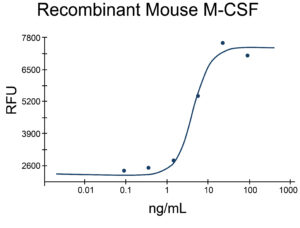 |
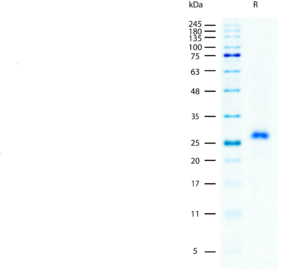 |
| Determined by a cell proliferation assay using mouse M-NFS-60 cells. The ED50 for this effect is typically <10 ng/mL. | Recombinant Mouse M-CSF/CSF1 Protein (2 ug/lane) on SDS-PAGE under reducing (R) conditions. The gel was stained using Coomassie® Blue showing a single band at 26 kDa and purity greater than 97%. |
Background
| Alternative Names | Macrophage Colony Stimulating Factor, CSF1, CSF-1, MCSF, MGC31930, Lanimostim, PG-M-CSF, Proteoglycan Macrophage Colony Stimulating Factor |
| Function | Macrophage Colony-stimulating Factor (M-CSF), also known as CSF-1, is a cytokine with roles in the growth, differentiation, and survival of monocytes and macrophages. M-CSF promotes the differentiation of monocytes into mature tissue-resident macrophages involved in the phagocytosis of pathogens, clearance of debris, and secretion of growth factors for tissue repair. In addition, M-CSF is involved in regulating bone homeostasis by stimulating osteoclast differentiation and activity. M-CSF is primarily produced by monocytes and macrophages themselves. It acts in an autocrine and paracrine manner to regulate the proliferation, differentiation, and survival of these cells. However, M-CSF is also produced in bone marrow stromal cells, fibroblasts and endothelial cells as a component in the local microenvironmental regulation of the immune cell function. M-CSF is often highly expressed in the tumor microenvironment where it recruits tumor-associated macrophages (TAMs) that suppress the native immune response leading to tumor progression and infiltration. M-CSF binds M-CSF R (CD115), a Receptor Tyrosine Kinase (RTK) family III member. |
| Tissue Specificity | Bone marrow stromal cells, spleen, vascular endothelial cells, endometrial secretory epithelium, respiratory and gastrointestinal epithelial cells, and synovial fibroblasts. |
| Cellular Localization | Membrane-bound and cleaved soluble protein forms |
| Involvement in Disease | Dysregulation of M-CSF is implicated in autoimmune disorders (rheumatoid arthritis, atherosclerosis, inflammatory bowel disease), osteoporosis, cancer tumor progression, cancer immune evasion, monocytic leukemia and neuroinflammatory processes in Alzheimer’s disease and multiple sclerosis. |
| UniProt | Q3U4F9 |
| Gene Symbol | CSF1 |
| Entrez Gene ID | 12977 |
Product Documents
| Product Datasheet | Download Product Datasheet |
| COA | Contact Us |
| SDS | Download SDS |
You may also be interested in related products:
Reviews (no reviews yet)
Only logged in customers who have purchased this product may leave a review.
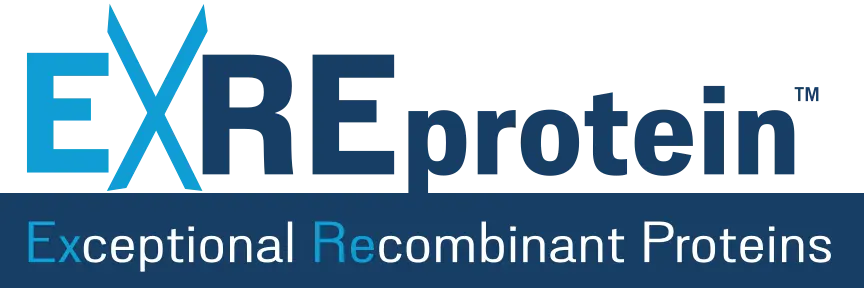

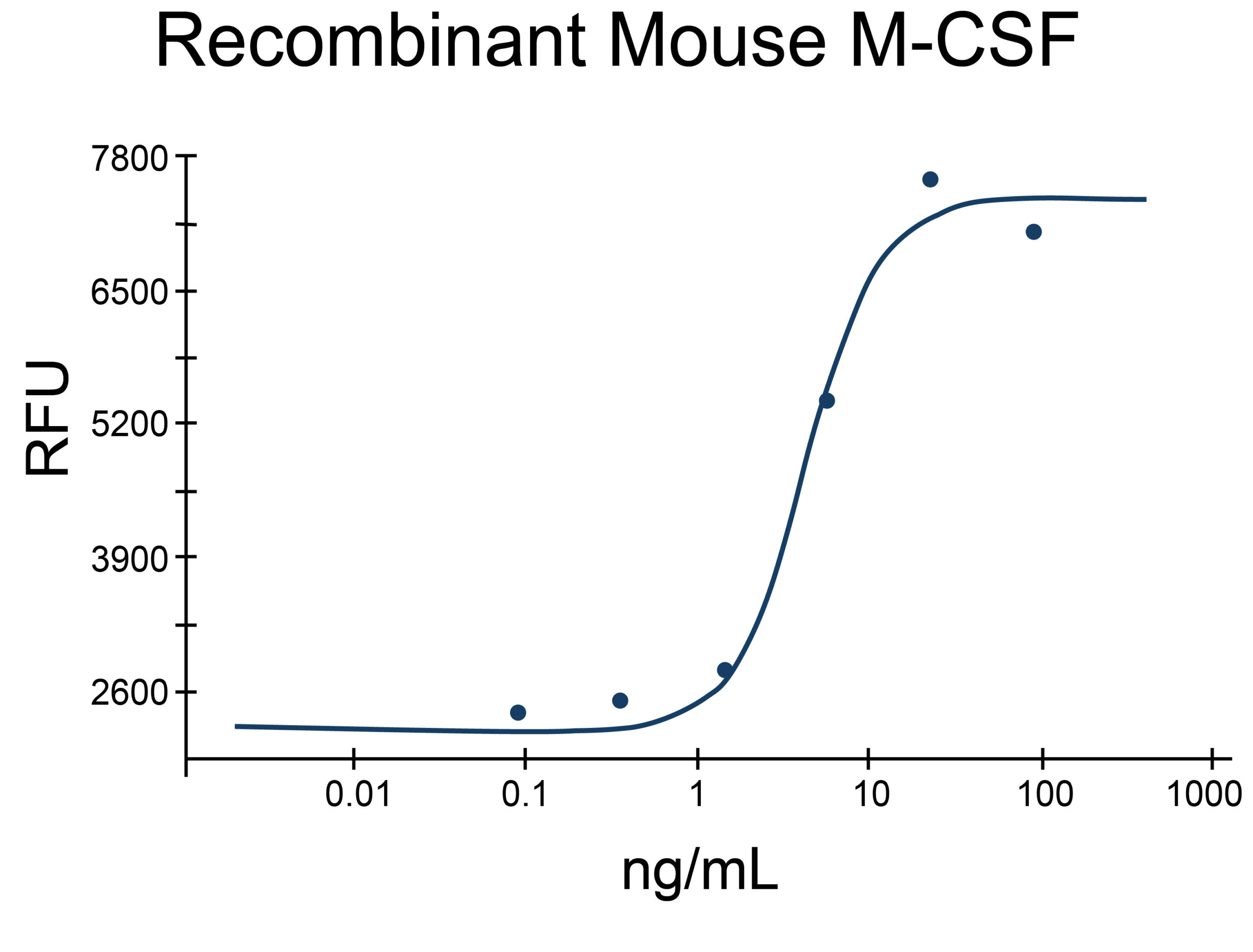
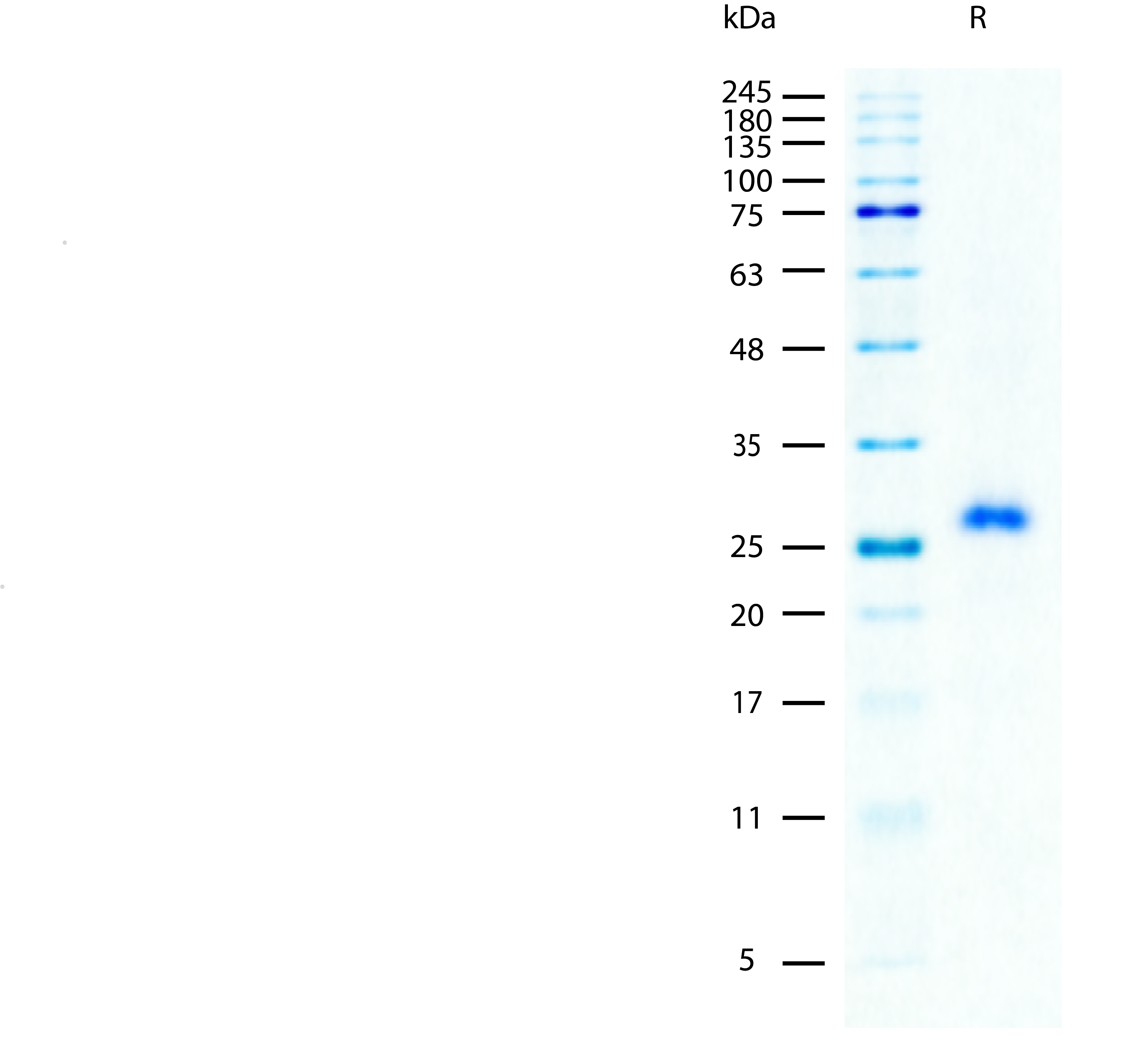

Reviews
There are no reviews yet.